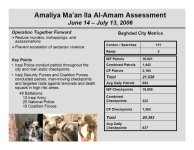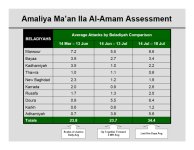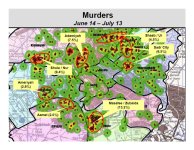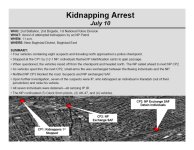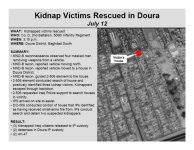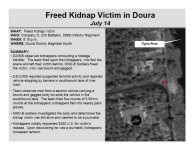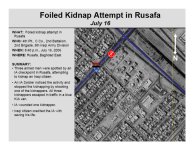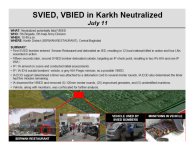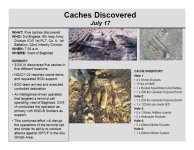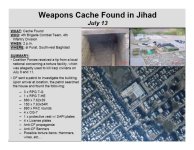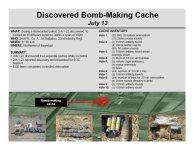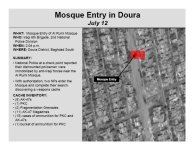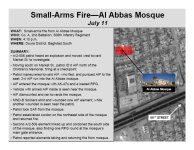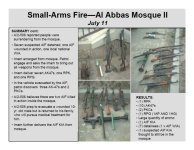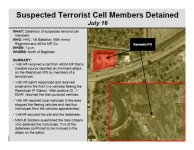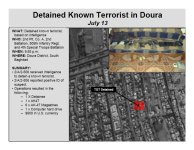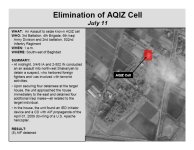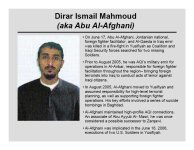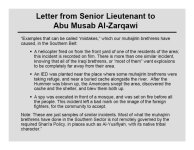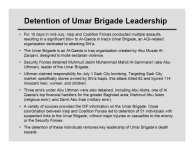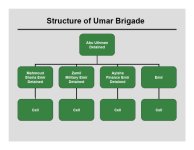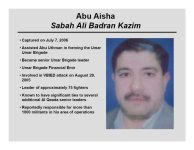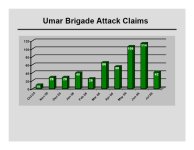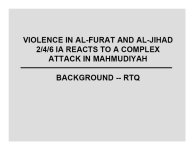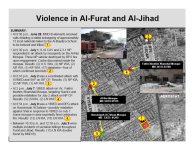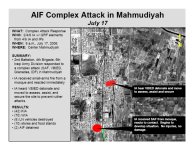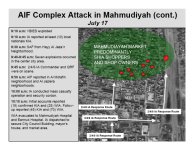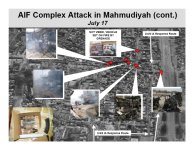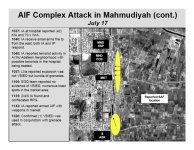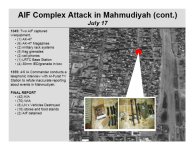
Operations Update, July 20, 2006
Multi-National Force-Iraq
Wednesday, 19 July 2006
(Unedited Transcript)
IRAQ OPERATIONAL UPDATE BRIEFING BRIEFER: MAJOR GENERAL WILLIAM CALDWELL, USA, SPOKESMAN, MULTINATIONAL FORCE IRAQ LOCATION: COMBINED PRESS INFORMATION CENTER, BAGHDAD, IRAQ TIME: 9:03 A.M. EDT DATE: THURSDAY, JULY 20, 2006
GEN. CALDWELL: Good afternoon, ladies and gentlemen. Today we're going to address the 30-day assessment of Operation Together Forward.
Let me first begin, on behalf of General Casey, who noted in his joint statement with Ambassador Khalilzad yesterday, that we condemn -- as they say, quote: "We condemn in the strongest possible language the recent attacks by terrorists and death squads against innocent Iraqi civilians in Kufa and Mahmudiyah. We express our heart-felt condolences to all the family members who lost a loved one in these vicious attacks, and for all the Iraqi people who suffer at the hands of these criminals. We mourn the loss of every Iraqi life and are determined to help the Iraqi government bring peace to all Iraqis and to restore dignity and security to this great nation. We, therefore, pledge to work with the Iraqi government and security forces to treat the death squads as the same critical threat to Iraqi security as the terrorists who target Iraqi civilians, and to deal with them in the same manner." End of quote.
Slide, please -- chart, please.
When Prime Minister Maliki announced his Baghdad security plan, he noted at the tenet of this (base ?) is -- the goal of this plan is to secure the citizens' lives here in Baghdad. What I'd like to talk about for a moment are some of the key points that have occurred during the last 30 days as we have executed this operation with the Iraqi security forces in the lead and coalition forces in support.
Go back one, please.
As you look at the chart, the key thing I wanted to point out here for you is the fact that we have a tremendous amount of Iraqi security force patrols that are occurring in the Baghdad area. Combined patrols, much, much less; Iraqi security forces clearly in the lead. Our daily average number of patrols in the city, with the Iraqi security forces operating mostly independently, is about 700 a day. Checkpoints -- if you take it over 30 days, that's how many have been up, operational, have been operating in the city. And again, daily you'll find out there about 600 in the city itself being utilized.
Altogether, there's 48 battalions of both coalition and Iraqi security forces that are operating within the Baghdad security plan. And again, the whole intent of this is to reduce murders, kidnappings, and assassinations that have been occurring with the city. I think you know there's approximately 51,000 troops altogether involved in this operation; roughly 21,000 local Iraqi police, 13,000 Iraqi national police, 8,500 Iraqi army personnel, and approximately 7,200 coalition forces.
Bearing in mind that the Iraqi security forces have been in existence for less than three years, Iraqi civil and military institutions and service members are coordinating at unprecedented levels -- communicating, sharing intelligence, and operating together as they have never done before. From June 14th through July 13th, as you saw, they conducted just over 20,000 patrols.
As you look throughout what's occurring in the city, I know the question's asked, are these efforts enough? And the answer to that is no, but it's a start, and we're moving in the right direction. While most of this country -- if you look across 18 provinces that are out there, 14 of them almost experience zero to none incidents on a daily basis. But there are four provinces where we need to focus our efforts and to continue to put the efforts, utilizing the coalition and Iraqi security forces to reduce the level of violence. And again, specifically, Baghdad is the number one that the prime minister has set as a must-win.
Slide and chart, please. I'd like to walk you through the statistics over the last 30 days. These are the average attacks that occurred in each beladiya by comparison. Just after the Samarra bombing, this is what we were averaging in each of these beladiyas; these are the number of attacks that would occur today. So if you take Mansour, there was about 7.2 attacks per day that were occurring in that beladiya. When we put Operation Together Forward into place, it was reduced.
There was in fact a slight reduction in the level of the violence. And as you walk through this, you'll see that all except two beladiyas were able to experience a slight decline, which is exactly what the intended purpose was.
As we said from the very beginning, this isn't a plan that's going to be executed and completed in weeks, but rather in months. And so the overall statistic was 23.8 there before the operation was put into place by the prime minister; it went down to about 23.7. So there was in fact a slight downtick that was occurring, and progress was being made as we moved forward with this operation.
However, I would not want to leave you with the impression that we are not very much aware of and cognizant of what has occurred in the last five days, so we went ahead and put the last five days' statistics up there.
We had two significant incidences, and you heard the initial comments from the ambassador and from General Casey as to what they had to say about that, and that in fact is far above the average which which we have been experience. But that's something we'll deal with, too. (Pause.)
Slide and chart, please?
To place this saddening violence in context, we should note the extreme concentration of attacks in roughly five areas around the city. This contrasts to the swaths of Baghdad experiencing somewhat relative peace. Hundreds of thousands of Baghdadis live a regular life day in and day out, unmarred by the violent attacks on civilians in the most troubled areas, experiencing 41 percent of the murders that are occurring. Although one murder victim is too many. The numbers, we note, are disturbing. The weekly average through the first month of this operation have held steady. Though the number of attacks on civilians has increased, the effectiveness overall has decreased.
And again -- to point out again, as we said, we were going to come back to talk about where and what happened in the first 30 days of this operation.
We find up here in Adhamiya a heavy concentration of where the murders' victims have been found. Where exactly they were perpetrated, we're not always exactly sure, but that's where the vast majority were found, there; Adhamiya right here, too; over here in Shula; and then down here, of course, in Dura. (Pause.)
While the last five days or so should not be an indicator of the Baghdad security plan overall, neither can they be brushed aside. And again, we will do whatever it takes to bring down the level of violence here in Baghdad.
From June 13th through July 19th, Iraqi security forces have suffered casualties in their efforts to bring security here to the Baghdad area. They have been valiantly involved in this fight. Killed in action -- 31 national police, 24 local police and 27 Iraqi soldiers. Wounded in action -- 114 national police, 103 local police and 227 Iraqi army soldiers, for a total of 92 killed in action and 444 wounded performing in the line of duty. Clearly, the Iraqi security forces are engaged, they're committed and they're given the role to bring security to the Baghdadi citizens.
Slide and chart, please.
Again, to keep the situation in Baghdad in some perspective, I must realistically note that while the last days have been tough, we have not witnessed the reduction in violence one would have hoped for in a perfect world, but there have been some successes. In your handouts that each of you have, you have been provided extensive operational details, and what I'd like to do is highlight just a couple of these as we go through.
We all know and experience that kidnapping is a terrifying crime for anyone to endure, and it inflicts pain and uncertainty on countless family members and their friends. Iraqi security forces, by the nature of their presence out on the streets and operating in Baghdad, have been impeding the movements of terrorists and other criminal elements and have foiled a number of kidnap attempts.
I can start here on this first one on July 10th. My intent is not to spend a lot of time on each of these -- again, you've got all the details in your packets -- but rather to point out there have been a lot of successes in this operation. We are seeing Iraqi security forces -- the local police, the national police and Iraqi army forces -- coming together working as one team, sharing intelligence, coordinating amongst checkpoints, as they conduct their operations.
And what you saw in this one was in fact at a checkpoint where an element had come through with some kidnap victims inside the vehicles, were eventually chased down and captured, and it turned out to be some Iraqi police themselves. So we had Iraqi police in fact policing their own, cleaning it up, and having been able to foil that kidnapping attempt. The bottom line to that is, no one is above the law.
Next slide, please.
And again here's another situation where in this house here, again as we started operating, people observed some unusual movement, saw some vehicles moving around with weapons being exchanged between them, took them under observation, watched where they went to, and then moved to that house, conducted an entry into it and found inside kidnap victims. Again, Iraqi security forces with coalition forces in support being vigilant out on the street conducting daily operations in the Baghdad area. It ended up being three kidnapped Iraqi citizens were released as a result of that vigilance of some forces out there on the ground paying attention to what's going on on a daily basis. Next slide, please.
And again here's another situation where we have forces out on the ground observing operations and they see something very unusual occurring with the car, with something being moved outside of it. And at the very end, they're able to move forward -- this is the Tigris River. Clearly, somebody who had been bound and gagged was being moved out of the car. They went over and intercepted that. An investigation determined that the kidnap victim was still alive, and he claimed to be a journalist. The kidnappers initially had requested a $300 ransom for the victim's release, but upon discovering he was a journalist, as he stated, the kidnappers had increased his ransom.
Clearly, the free and independent media in Iraq are targeted too just as anybody else. Even if the criminal or extremist only thinks you're a free press, you're obviously targeted just like everyone is.
Next slide, please.
This one here, we had three armed men near a checkpoint attempting to kidnap somebody. Iraqi army soldiers noted this activity and stopped it by shooting one of the kidnappers.
Again, if you were to talk to the Iraqi citizen on site there, this location where it was the Iraqi army checkpoint, that's where they observed armed men attempting to kidnap a person, which they moved to engage and stopped it. He will tell you exactly what -- how he felt about the performance of the Iraqi forces in that location.
Slide and chart, please.
The volume and flexibility of Iraqi-manned checkpoints has inhibited the movement of enemy and the ability of them to strike at innocent civilians. Not every attack has been stopped. There have been tragic, sensational, attention-grabbing attacks, but countless attacks have been prevented or mitigated because the checkpoints are out there, in many cases taken the hit instead of the civilian establishment. This incident highlights the growing capability and expertise of Iraqi explosive ordnance personnel.
I think most people are familiar with this one and this situation right outside here, the Green Zone. Two suicide bombers had come into a restaurant. The first one had come in and blown themselves up, wounding and killing some Iraqis. Then, a second one came in and did the same thing. The Iraqi forces responded to that location, started providing first aid, when one of them noticed a suspicious-looking vehicle right near by. Although not well reported in the press, this is the van that they noticed in the same location.
Upon further examination inside, they saw this arsenal of explosives with a timer attached to it that was set to go off. Clearly. the intent had been by these death squads to produce a casualty event, have the first-responders arrive, and while medical treatment and onlookers were gathering in that area, then have the vehicle-borne improvised explosive device go off inflicting far greater casualties. But through the diligence and the work of the Iraqi security forces there who noticed this suspicious-looking van and then called in the Iraqi EOD personnel, the explosive ordnance detachment personnel, they in fact went in there, found the timer with about five minutes left on it, were able to defuse it and neutralize that threat.
There were a total of 620 millimeter mortar rounds in there, 25 improvised grenades and some additional munitions. They're on the bottom far right.
Slide, please. And again, the only way we're going to be successful in Baghdad too is to get the weapons off the street and the explosive ordnance off the street, and we continue to work, as you can see here, elements out, still looking around, finding different caches of weapons all around the Baghdad area, consistent with material that's used both in improvised explosive devices and in for direct-fire engagements against Iraqi security forces and coalition forces.And you can see the amount in five different locations here were found with different systems and munitions in each one.
Next slide, please. This is in Jihad, when we had a discussion last time we were all together, and this is the torture chamber that had been reported by a local Iraqi citizen on a tip to coalition security forces and Iraqi security forces who then went and investigated and found that cache of weapons at that location. You can see the amount of things they found there. But again, a brave Iraqi civilian stepping forward, providing information that allowed the security forces in Baghdad to go, and in fact neutralize this torture chamber that had been used, and to find that cache of weapons there in Jihad. All together there were 948 tips received in Baghdad from the hotline during this 30-day period.
Slide and chart, please.
And again, as we continue looking, we -- this is an area where we found 10 different locations of munitions that are primarily used in improvise explosive device. Again, the only way we're going to be successful in this city is to take these bomb-making materials out of the hands of those who wish to use them to inflict casualties on innocent Iraqi civilians.
Slide, please.
This is another one where coalition forces, operating with the Iraqi security forces, in fact went to a mosque where they had seen some insurgent elements run back into, and were able, through the Iraqi security forces, to move inside and, in fact, find a cache of weapons inside there. And again, seeking permission from the local Imam, the Iraqi security forces gained permission to enter the mosque, went inside and found that cache of weapons.
Next slide, please.
This is one where -- and I won't go through all the details, but, rather, just say security forces came under attack by some kind of element out there, whether it was a death squad or a terrorist element. They responded, chasing them. Next slide. Eventually coming into the mosque itself there. Where the Imam inside -- because the people had fled in there -- worked with the Iraqi security forces and brought the weapons outside and eventually surrendered the personnel who had gone inside the mosque. Again, close cooperation between the Iraqi security forces and the local religious senior person there on the site.
Next slide, please.
To continue on with the topic of Iraqi citizens' cooperation, coalition forces received a call from a credible source about an imminent attack that was going to take place on the Iraqi police station. Coalition forces immediately responded to the location based on this tip again from an Iraqi civilian, and in fact were able to come upon it. As forces -- as terrorist elements were in fact engaging the police station, as they attempted to flee, local citizens in the area blocked the exit of the vehicles and, in fact, apprehended the four individuals that had been in those vehicles, and then turned them over to coalition forces for questioning and detention.
Next slide, please.
Here, intelligence led to the apprehension of a known terrorist in Dura, including weapons and a large amount of U.S. currency. And again, this is based operating on another tip.
Next slide, please. Clearly, the key to Baghdad security is the Iraqi citizenry, the everyday, hard-working individuals who go to work, go to school, and to pray. Removing the terrorists from their midst is paramount.
In this regard, here we can see another situation where at midnight, Iraqi army members and coalition forces conducted an air assault into that local there, northwest of Shakariyah (sp) to detain a suspect who was suspected of harboring foreign fighters, and was involved in terrorist activities. Upon securing four detainees at the house, the unit approached the house immediately to the east of it, and there they detained four additional Iraqi males, all related to the targeted individual. In the house, the unit did find an IED initiator device with a CD and propaganda from the downing of the Apache Helicopter that occurred down -- on April 1st down in the Yusufiya area.
Iraqi and coalition forces continue to target, to disrupt, to degrade, to confuse, and to eliminate the al Qaeda in Iraq network. Baghdad is a must-win not only for the prime minister, but for al Qaeda in Iraq. Without Baghdad's centralized access to power brokers, Baghdad's large, diverse population, its financial resources, the terrorist elements will lose here in this country.
As with any insurgent movement, with its leadership gone or on the run, the combative arm strikes out to prove viability, not with strategic precision, but against soft targets they can reach. And in this case, that's innocent Iraqi civilians, those who they will kill for intimidation, promotion, power and/or for retribution.
Slide and chart, please.
The follow-on is what you all heard from Dr. Rubaie, Iraqis' national security adviser, the other day. Abu Afghani, as shown here, in fact was killed in an operation that was conducted earlier last month. As we know, he's a Jordanian national, former al Qaeda in Iraq emir of Yusufiya, and was killed during a firefight with coalition forces as they searched for the two missing soldiers that had been down in the Yusufiya area.
Members of his cell were implicated in the June 16th execution of those two soldiers, and al-Afghani may have had a role in this operation. He was a noted foreign fighter, facilitator for al Qaeda in Iraq, who brought foreign fighters into Iraq to take part in terrorist activities. Al Afghani was previously active in the (Baiji ?) and Al Anbar Province, and we believe we left there sometime in August of 2005.
During his time in Al Anbar and Salahuddin, he was the al Qaeda military emir for operations, responsible for foreign fighter movement through Al Anbar. Additionally, al-Afghani commanded foreign fighter units engaged in al Qaeda acts of terrorism, consistent attacks against checkpoints at (al Qaim ?), (Husaybah ?) and Yusufiya and was involved in kidnapping operations.
After he left Al Anbar, he relocated to Yusufiya and the southern Baghdad belt, where he became active in high-level al Qaeda operational planning and foreign fighter and suicide bomber facilitation. Even from Yusufiya, he continued managing key foreign fighter facilitation for al Qaeda through Al Anbar.
Al-Afghani maintained high profile connections with al Qaeda in Iraq. We believe he was a close associate of al Qaeda in Iraq emir al Qaeda in Iraq emir al-Masari (sp) and was once considered to be a potential candidate to replace al-Zarqawi. His death is a direct blow to the terrorist foreign fighter facilitation network and al Qaeda operations in Al Anbar and southern Baghdad belt. Al Masari (sp), in his new role as emir of al Qaeda in Iraq, will be hindered by the death of al-Afghani, a close associate with whom he had assumed additional foreign fighter facilitation network responsibilities since al-Masri left that role in the organization.
Al-Afghani's death is another significant loss to al Qaeda in Iraq following a close series of setbacks as we have seen over the last 45 days, resulting in further degradation of the organization's leadership structure.
Slide, please.
Iraqi security forces and coalition forces continue to exploit the information, evidence and intelligence from the stream of objectives following elimination of Zarqawi. In a letter recovered during the raids that followed the death of Zarqawi, an al Qaeda in Iraq leader addressed how foreign fighters in Yusufiya and the southern belt surrounding Baghdad had made several tactical mistakes and were not following the Shari'a law and have no concern for the welfare of the Iraqi people. This letter provides evidence of how al Qaeda in Iraq lacks command and control of foreign fighters in Iraq and how these foreign fighters in Iraq indiscriminately conduct acts of terror against coalition forces, Iraqi security forces, but most importantly, what we have seen, Iraqi innocent civilians.
Al-Afghani, active in Yusufiya and responsible for foreign fighters, was likely one of the individuals referred to in this letter who do not care for the Iraqis and did not follow the Shari'a law. His death will significantly impact the rogue foreign fighter element responsible for several acts of violence against Iraqis and coalition forces in Yusufiya.
Slide and chart, please.
Earlier, I noted the coalition's commitment to treat the death squads as the same critical threat to Iraqi security as the terrorists who target Iraqi civilians, and to deal with them in the same manner.
An example of finding this is the dogged pursuit of the Umar Brigade, a death squad created by Zarqawi to target Shi'a and specifically designed to incite sectarian violence.
, please.
Iraqi and coalition forces conducted multiple assaults over 10 days in early to mid-July, resulting in a significant blow to the Umar Brigade. Operations focused in the Baghdad area since July 7th have resulted in security forces successfully detaining four of the top leaders within the Umar Brigade, two who are well-known as top al Qaeda in Iraq leaders as well. The detained terrorist leader of the group, Abu Uthman, had claimed his group was responsible for the July 1st bombing in Baghdad, which had targeted the Sadr City market, specifically stores owned by Shi'a Iraqis. And as we all know, that attack killed about 62 Iraqis and injured another 114, including men and women.
Slide and chart, please.
As we look at the structure of that brigade, these are the four individuals in that organization that in fact have been detained during those operations that were conducted in about a 10-day period here in early July.
Terrorist organization death squads, however, even though we've been extremely successful in bringing down this organization, still continue to try and terrorize Iraqi people, and will do anything they can to impede stability and peace and the progress of moving forward here in the Baghdad area. Today, despite a tough week, we are able to discuss the ongoing efforts and to set conditions for peace and stability in Baghdad. We are able to note suspects that have been apprehended, victims that have been spared further suffering and continuing progress against violent extremists who desperately target civilians for impact to enhance their understanding and for maximum media coverage.
Iraqi and coalition forces can set the conditions to allow peace to occur, but they cannot make the peace. Military force cannot make peace. It will take the local government, it will take the local imams and it will take the people to dialogue with each other and work together as one coherent effort to achieve the security and peace that all the people of Baghdad and all the people of Iraq want to see.
With that, I'll be glad to take any questions you all have.
Yes, sir.
Q General, it's John Hendren from National Public Radio.
You showed us the rise in violence over the last week. This is about a month into the new security plan. What do you attribute that rise to?
GEN. CALDWELL: John, our assessment of this is it's just like we have seen in the Baghdad area. Clearly, the death squad elements, the terrorist elements know that Baghdad is a must win for them. Whoever wins the Baghdad area, who isn't really able to bring and security to that area, is going to set the conditions to stabilize this country. They will do an all-out assault against the Baghdad area. We have seen the movement of terrorist elements into the Baghdad area. We have seen the flow occurring. We have seen the increase in volume of weapons and munitions being -- trying to get into the Baghdad area.
They know they cannot allow this effort to succeed. If Prime Minister Maliki succeeds in Baghdad, he'll be able to succeed in Iraq. So they will do everything they can to in fact stop that. If it means targeting innocent Iraqi civilians, conducting sensational attacks against them, that's exactly what they will do.
Q And can you tell us where these folks are coming into town to commit these attacks or coming from?
GEN. CALDWELL: We see them primarily coming from two different -- three different locations: from the northeast, from the Diyala province area; from the south, down in the Yusufiya area; and then over in the northwest.
Yes, sir?
Q Borzou Daragahi from the Los Angeles Times. I have two questions related to the incident at Jihad which seemed to spark the latest upsurge in violence or attributed to that or it could be attributed to that -- the latest upsurge. Do you know what the military's assessment of what happened in the Jihad neighborhood on the morning of July 9th -- what the assessment is? Is there a timeline? Is there a version of events that the U.S. military has?
And my second question was just with regard to this cache of weapons found in Jihad, according to this packet. Do you know if you would attribute that to Shi'ite death squad elements or to Sunni terrorist elements or however -- whatever terminology you would use -- who you would attribute the cache of weapons to? Thank you.
GEN. CALDWELL: In the Jihad area, I'd have to go back to an exact sequence of events that occurred that morning. We went back and looked at the -- we know Iraqi security forces initially were responding to that. They called for support from coalition forces who did respond. We can get you the time that the coalition forces responded to that location and what actions were taken. I don't have it for the Iraqi security forces. We probably could ask General Aziz or somebody else in the Ministry of Defense or Ministry Interior exactly who responded first there to that location.
As far as whose weapons caches that was, we're not certain. I know that each time they pick up a cache, they look at it, they try to exploit, they try to understand where the weaponry came from; how long it had perhaps been in existence; was it recently perhaps from outside the country, from some other country; and then, if there's any other identifying stuff associated with it. But I have not seen the readout from that cache at Jihad. We can check, and if there is something, we can make that available too.
Yes, sir?
Q Hi. Paul Schemm, AFP. The prime minister recently made reference to the incidents in Kufa, Mahmudiyah and up north in Tuz and described it as showing the weakness of al Qaeda because now they're moving outside Baghdad to do their operations.
I was wondering how that jived with the movement your seeing of elements into Baghdad. I mean, is it a two-way movement? Are some going out to do operations and some coming in? I was just curious if you saw a trendline in this regard.
GEN. CALDWELL: Paul, we're still seeing a trendline with people moving into the Baghdad area and conducting operations there. There's always been incidental operations outside of the Baghdad area. But we still look -- we look at the Mahmudiyah area as part of the greater Baghdad area that we're operating within right now, and are very concerned about those type of activities that occur, like did occur there this week.
But, no, we're not necessarily seeing a trend outside. There have been discussions of that, obviously; people wondering if perhaps with the presence there, if the movement has stopped the death squads and the terrorist elements to where they want to go operate more freely. There may be some small residual, but there's nothing deliberate that we have seen at this point.
Yes, sir?
Q Thank you. Larry Kaplow with Cox Newspapers. Thanks for these statistics, first of all, on the operation.
To follow up on John's question basically about why there haven't been more results yet, you gave sort of a general answer that they know Baghdad's a must-win. But that's been the situation for a long time. And what a lot of Iraqis feel like is that, you know, now there was -- you have the new government, Zarqawi is dead, most of the troops who are going to be trained and put out on the street are out on the streets, and this is the result.
And we also had the ambassador telling the Senate the other day that the results so far, according to him, were not just -- you know, it's only been a few weeks, or that in a perfect world you would want better results, he said that the results were not what you were anticipating.
I wonder if you could go further into why that is, why this hasn't come off better, despite all the framework that's been set up around it. And doesn't that really challenge the whole theory of how this is supposed to work?
GEN. CALDWELL: Larry, first of all, we are still fielding, as we speak today, Iraqi security forces. There are still Iraqi army forces and Iraqi police forces that are still in training and being fielded. In fact, I think you should know -- and we can get you the exact statistics -- but there's still another about 60,000, 70,000 that are still to be fielded out there in their forces that have not been fully trained, equipped and employed. So they are not at some kind of final end state where you can sit there and say the Iraqi security forces are up, running, they're 100 percent equipped, they're ready to go --
Q But you have 168,000.
GEN. CALDWELL: That is correct. And if you take and you look at a city like Baghdad, if you're trying to make -- what is the amount of security -- (audio break from source) -- 8 million people. If you were to go check with Ray Kelly, the commissioner, and ask him how many police he has, he probably has about 40,000 police operating in that city. We have 50,000 newly formed, newly trained Iraqi army forces, Iraqi police forces, and about 7,200 coalition forces that are working together for the first time ever, operating within a 7.2 million-size city. There are going to be challenges, and it's going to be tough, and it's still going to be hard.
We are by no means at the end state, at the place where the Iraqi security forces are able to assume complete control of this situation.
Baghdad is a must win. The prime minister and General Casey and the ambassador have all committed to do whatever it takes to make this a successful operation. They will do whatever it takes. They're in continuous dialogue right now. They're continually reassessing the situation. They will make adjustments and refinements to the plan as the prime minister had initially laid it out, and they'll keep working at it.
We said from the very beginning this is going to be months, not weeks, and people do have high expectations. They see additional security forces coming into the city, they see additional checkpoints being established. They, like anybody else, want to live in a peaceful and security environment. We understand that. But it will take some time. It's going to take several months. It's not something that's going to occur overnight.
Yes, sir?
Q (Through interpreter.) (Name inaudible) -- from Sumariya Channel (sp). General William, recently Prime Minister Nouri Maliki said that Mujahideen-e Khalq Organization in Iraq has influence in the bombings in Iraq, and there are military operations, kidnappings. The Iranian opposition group has the hand in these operations. He said that this organizing has impact in Iraq.
What is the kind of the operation made by this organization? And do you have any information that -- about the intense performance of this organization in Baghdad?
GEN. CALDWELL: Could I ask you again the -- I missed the very first part -- the name of the organization.
Q MEK.
GEN. CALDWELL: Pardon?
Q MEK.
GEN. CALDWELL: MEK? Currently, I think, as you know, the MEK is out at Ashraf in a secure military facility that the coalition forces, in fact, guard on a 24-by-7 basis. They're under continuous surveillance and control. Their future status does need to be eventually determined, but currently, they're not operating within the country of Iraq. They're in a fenced-in facility, a very large facility out there, and there is quite a few coalition forces that are there continuously guarding that facility to make sure they in fact are not allowed access out of it, and if it is, it's a controlled access, where they are in fact are escorted the entire time.
Yes, sir?
Q (Through interpreter.) (Name inaudible) -- from Radio Sawa. I have two questions. Prime Minister Nouri Maliki, in addressing the Iraqi Council of Representatives, he said that there is a plan which was thwarted to occupy Karkh. Do you have any information about this plan which Maliki talked about?
He also said that the failure of Iraqi intelligence leads to the weakness of the Iraqi government. The second question, in your opinion, what is the reason that tens of Iraqis were killed daily despite the Baghdad security plan? There is accusation by the Iraqi members of parliament that the U.S. forces help in this just to fail the Iraqi government in order to create a (salvation ?) government.
GEN. CALDWELL: Can I ask you at the very beginning again, your question was Maliki had talked about the plan to thwart something. What was that specifically you're asking about again?
Q (Through interpreter.) Prime Minister Maliki said in the parliament that there is a plan which was thwarted to occupy -- he didn't mention the militant groups -- actually, to occupy Karkh, the sector of Baghdad.
He addressed the Council of Representatives.
GEN. CALDWELL: I'm not sure of the exact comments that the prime minister made that you're referring to or exactly which plan specific that may have been thwarted.
I do know that through the combined and coalition efforts, there has been a tremendous amount of intelligence sharing going on, and they have in fact stopped several large-scale plans that have been -- that would have probably taken place against Iraqi civilians. And I think that's specifically what he's referring to, and that has in fact occurred, and we have not discussed those openly.
When you talked about the failure of Iraqi intelligence, I can only tell you that we work very closely with Iraqi intelligence as part of the ongoing effort to develop those services so they can in fact assist the government of Iraq and eventually be operating independently. And any information that we have that is pertinent to them we in fact do share. So they actually have a tremendous amount of access to information.
As far as the comments that were made by a member there in front of the Council of Representatives about U.S. forces and whether or not they in fact were contributing to the increase in violence that we have seen in the city, I would just have to tell you that's just categorically incorrect. U.S. forces, in fact, operate in support of the Iraqi security forces. We're there partnering with them. We're making our resources available whenever they ask for them. We just as much as the Iraqis themselves want to see a downtick in the amount of violence that's occurring inside the city. There is nobody who wants to see ever an innocent civilian injured or killed. It just -- the entire purpose we are all there -- "we" being the Iraqi security forces with coalition forces in support -- is to provide a peaceful and stable environment where the Iraqi citizens can live without fear and intimidation, without fear of being kidnapped, without fear of being murdered and go on to live a prosperous and secure life.
Yes, sir.
Q Just very basically, how do you define attacks on this? Is it against anyone and any kind of incident?
GEN. CALDWELL: It is, that's correct. And again, these are the ones that we're aware of. There are a lot of areas where Iraqi security forces are working, as you know -- and you saw the statistics -- very independently. But we are working as a combined operation. We see the statistical reporting, the data that they collect, and it's a(n) accumulation of what they've reported, and again, what our own teams on the ground and our people have seen and what we get from the Iraqi security forces.
Yes, sir.
Q General, Julian Barnes from the L.A. Times. Given the last five days and the increase in attacks that you've seen then -- given your earlier statement about reviewing the security plan, what is not working about it? What are the kinds of things that you're going to be looking to sort of improve or change of the U.S. forces' or the Iraqi forces' strategy in this Baghdad security plan?
GEN. CALDWELL: As we've looked at the plan -- obviously there's a lot of checkpoints throughout the city where we in fact are impeding the movement of any criminal activity that's trying to move through there. We have patrols going out. But we've also looked at -- you know, this is a counterinsurgency-type environment we're operating in, and so the question that everybody's looking at real closely is whether or not, as we have seen out in Ramadi -- with some successes, they've continued their operations out there; you know, they tried to isolate the city and then they went in and took selected areas and focused in those areas and left a presence thereafter. And we're finding that it's been very, very successful; minimal damage to collateral damage to any of the infrastructure, to the people. There has not been -- you know, as you know they outflow people from there because of that, but then they're able to stabilize an area and allow the Iraqi security forces -- hopefully, eventually the Iraqi police -- to resume providing the security for that location.
So there is in fact an ongoing effort that has been taking place now for about -- for several weeks, really.
I mean, pretty much two weeks into this operation there was already assessments being made and asking ourselves -- we were making daily assessments, but at a much larger level, up to the prime minister, asking ourselves: Do we have it right? Do we need to change, do we need to make any modifications to the plan, to where the forces are positioned, to how we're operating? And in fact, I think we're going to find the prime minister is directing that some of these things take place, and we'll probably see those implemented very shortly.
Q General, so in terms of revising that, that would be where checkpoints are, what parts of Baghdad are more isolated off so that Iraqi security forces can do work in those areas; is that a correct understanding?
GEN. CALDWELL: One of the things I know that when the ambassador and General Casey and the prime minister have been in discussions, everything's been on the table; there's nothing that they have taken off the table for consideration in order to bring greater security to the Baghdad area. That would be a portion of it, but everything has been on the table in the discussions.
Yes, sir?
Q Hi, Charlie Crame (sp) with Time magazine. You mentioned that the policy is going to be to treat members of death squads the same way you would treat members of insurgent groups or terrorist organizations. I'm just curious in terms what the challenge is in doing that. If you go around and ask American forces on the ground, you find that they're operating with Iraqi police units that have Mahdi Army stickers on their trucks. You talk to American majors who say that when they get an Iraqi unit in their area, they have to go to the American advisers and ask to what extent is this unit infiltrated by militias.
How is it possible to treat death squads and militias like insurgent groups when, to some extent, the people who are doing the policing may be infiltrated by those groups?
GEN. CALDWELL: Charlie, the guidance that we're giving out to our people is that there is nobody above the law out there. Anybody who is operating outside the law, who is conducting criminal activities -- again, as we've described before, being from murders to kidnappings to intimidations -- in fact are subject to be prosecuted by force, and be apprehended, detained, and then turned over to the Iraqi court system. So, if there had been any question before about what is going on inside the city, the focus and the effort that we have continuously made on al Qaeda in Iraq remains, but in addition to that, anybody who is operating as a death squad will be targeted and subjected to direct actions by coalition forces and Iraqi security forces.
Q A quick follow-up. Operationally, do you draw a distinction between a militia and a death squad? Is a death squad a specific group of guys who are out trying to kill people?
GEN. CALDWELL: Yeah, we're not targeting any specific organization. We are targeting anybody who is operating outside the law. If you belong to some organization, it's irrelevant to us. If you are conducting criminal activity and it is observed, then you will be targeted. If it's known that you're conducting criminal activity outside of the law, then you'll be targeted, and intelligence will be developed, target sets will be made up and actions will occur to, in fact, apprehend you.
Yes, sir?
Q Tom Lasseter, McClatchy Newspapers. Do there need to be more American troops in Baghdad? And if so, how many? When you talk about Ramadi and some of the other clear-and-hold operations, you've seen massive buildups of U.S. and ISF troops. Is that something you are looking at? And if so, what sort of scale of upping the troops here?
And my second question is, you talked about the four provinces where you've seen the preponderance of attacks in Iraq. You know, I'm guessing those are the same four provinces -- Salahuddin, Nineveh, Anbar and Baghdad -- that military officers in Iraq have been talking about for the past two years. Is it at all a concern that the elements in those provinces have been able to continue to mount attacks in those provinces? in other words, if you shift it from the other way, instead of saying that there are 14 provinces where you're not having those large-scale attacks, if you were to look at it from the other perspective, they've been able to, if not geographically take hold in those provinces, they've been able to keep a consistent rhythm of attacks over a trend line. Is that at all troubling?
GEN. CALDWELL: The focus of the four provinces that we are talking about were Salahuddin, Diyala, Baghdad and Al Anbar. And we do want to bring down the attack trends in all four of those provinces. We in fact are conducting very deliberate operations out in the Al Anbar area, when you start talking about military aspects of what we're doing militarily to combat that, there's lots of other ongoing activities, from engagements to enlisting, you know, religious figures and everybody else to help with the situation too. So there's a lot of things that are going on. We do want to bring down the numbers, there's no question. Clearly the focus right now, though, is Baghdad. That's the number-one priority and where the focus will be.
As far as troop numbers, every option is on the table at this point. The prime minister has been briefed. He has those options available to him. He can, in fact, request it. There's nothing that's off the table at this point in order to enhance the security of Baghdad.
Q Looking at Baghdad both in terms of size and population, to do what's going on in Ramadi right now, proportionately how many soldiers and/or Marines would it take in Baghdad? There are about 8,000, I understood you to say, right now. GEN. CALDWELL: Yeah, 7,200.
Q I'm sorry, 7,200. How much would you have to plus-up from that to do what you're doing in Ramadi?
GEN. CALDWELL: The determinant there would be, what is the operational plan you want to execute, and then you make the forces available to execute that plan, whatever that is. Once the prime minister has solidified exactly how he wants to proceed forward and he has the minister of Defense and the minister of Interior with him on this and they've made that final decision, then the forces will be available, made available, both from Iraqi security forces side and from coalition forces side, to execute their plan. There is no limit that would be made. It's whatever is necessary to be successful in Baghdad will be made available.
Okay. Well, thank you very much everybody. '
END.
|
NEWSLETTER
|
| Join the GlobalSecurity.org mailing list |
|
|
|


